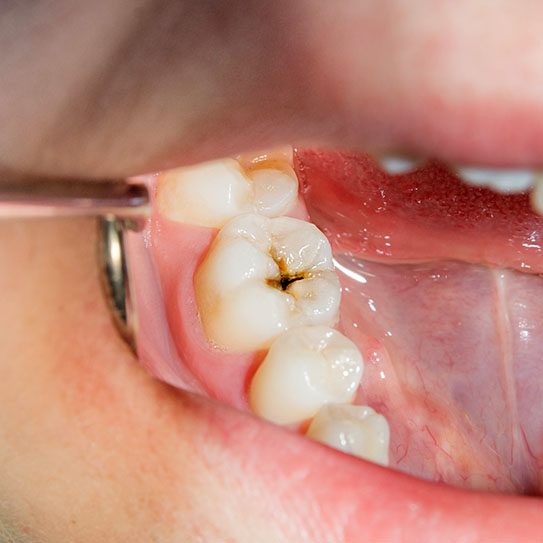
Can Cavities Be Contagious?
You’ve probably heard that cavities are caused by poor brushing, sugary snacks, and skipping dental visits. While that’s true, what many people don’t realize is that cavities aren’t always just the result of personal hygiene. In fact, research has shown that cavities can be contagious — yes, you read that right. The bacteria that cause tooth decay can actually be passed from one person to another. At Michael Kim and Melissa Lentz DDS in Mequon, we’re here to help you understand how contagious cavities really are and what you can do to protect yourself and your loved ones.
What Are Cavities, and How Do They Form?
To understand contagious cavities, it’s important to first understand how cavities develop. Cavities, also known as dental caries, are areas of tooth decay caused by acid-producing bacteria. The primary culprit is Streptococcus mutans, a bacterium that feeds on sugar and produces acid as a byproduct. This acid erodes the enamel, eventually creating holes or “cavities” in the teeth.
While diet and oral hygiene play a major role in cavity formation, the presence and spread of S. mutans can significantly increase your risk. That’s where the idea of contagious cavities comes into play, because the bacteria that cause them can be transmitted between people.
How Cavities Become Contagious
Contagious cavities occur through the transfer of bacteria from one person’s mouth to another’s. This can happen through everyday activities like:
- Sharing utensils or drinks
- Kissing
- Using the same toothbrush
- Blowing on a child’s food
Parents are often surprised to learn that they can pass cavity-causing bacteria to their children. In fact, studies show that mothers are the most common source of bacterial transmission to infants, particularly in the first few years of life when children are most susceptible to colonization.
So yes, cavities can be contagious — not in the way a cold spreads through a sneeze, but in a way that’s just as real and potentially damaging to your oral health.
Who Is Most at Risk?
While anyone can develop cavities from bacterial exposure, some people are more vulnerable than others. Children and infants are particularly at risk because their oral microbiomes are still developing. If a child is exposed early to S. mutans, they’re more likely to experience decay in baby teeth and eventually permanent teeth.
Adults with weakened immune systems, existing dental problems, or poor oral hygiene habits are also more susceptible to contagious cavities. If you’re in close contact with someone who has untreated tooth decay, your chances of acquiring harmful oral bacteria increase.
How to Prevent Contagious Cavities
Fortunately, there are simple and effective steps you can take to prevent the spread of cavity-causing bacteria:
- Don’t share utensils, drinks, or toothbrushes: Keep your dental tools personal and avoid swapping saliva with others when possible.
- Be cautious with infants: Avoid testing baby food with the same spoon or blowing on it to cool it down.
- Maintain good oral hygiene: Brush twice a day with fluoride toothpaste, floss daily, and visit your dentist regularly for professional cleanings.
- Get cavities treated promptly: If you have a cavity, getting it treated early helps reduce the bacterial load in your mouth and decreases the risk of spreading the bacteria to others.
Encourage dental checkups for the whole family: Keeping everyone in your household cavity-free helps lower the risk of contagious cavities spreading.
What to Do if You Suspect You Have a Cavity
Cavities can sometimes develop without noticeable symptoms. However, common signs include tooth sensitivity, pain when eating sweets or cold foods, visible holes or discoloration, and bad breath. If you experience any of these symptoms, schedule an appointment with Michael Kim and Melissa Lentz DDS right away. Our experienced team can diagnose and treat cavities early, preventing further damage and reducing the chance of spreading bacteria to others.
We use advanced technology and gentle techniques to restore your dental health and stop decay in its tracks. From fillings to dental crowns and preventive cleanings, we offer personalized care for every member of your family.
Why It Matters
Understanding that cavities can be contagious changes how we think about dental health. It emphasizes the importance of not only taking care of your own teeth but also being mindful of how your habits affect others, especially those most vulnerable, like young children. Preventing the spread of cavity-causing bacteria is an act of care that protects your loved ones and helps create healthier communities.
At Michael Kim and Melissa Lentz DDS, we’re committed to educating our patients on the latest dental research and helping them take proactive steps toward lifelong oral health. We see firsthand how contagious cavities can impact families, and we’re here to help you break the cycle with compassionate, expert care.
Protect Your Smile — and Theirs
Cavities don’t just happen on their own, and they don’t always stay contained. By understanding how contagious cavities spread and how to prevent them, you’re taking an important step in safeguarding your smile and the health of those around you. Whether you need a routine cleaning, cavity treatment, or dental advice, our team in Mequon is here to help.
Contact Michael Kim and Melissa Lentz DDS today to schedule your next visit. Together, we can fight back against contagious cavities and keep your entire family smiling strong.
The content on this blog is not intended to be a substitute for professional medical advice, diagnosis, or treatment. Always seek the advice of qualified health providers with questions you may have regarding medical conditions.
